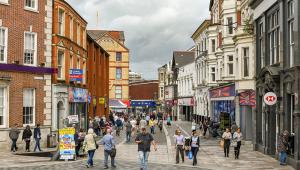
Last week’s announcement that the government intends to reduce maximum stakes on Fixed Odds Betting Terminals to £2 was fantastic news for the Local Government Association, councils and the many other organisations that have been calling for a reduction.
Most importantly, it was also good news for those whose lives have been blighted by addiction to these high stakes machines, and for those at risk of harmful gambling.
The LGA has long argued that, at £100, the current maximum stake is completely out of line with the £2 maximum stakes for comparable machines, and completely inappropriate for our high streets.
The profitability of the machines, coupled with the restriction of four machines per betting shop, has helped fuel the clustering of betting shops in some of our most deprived neighbourhoods, something councils, as both planning and licensing authorities, have been powerless to stop.
Independent research by GambleAware has confirmed that “areas close to betting shops tend towards higher levels of crime events, resident deprivation, unemployment, and ethnic diversity… [and that] players overall tend to live in neighbourhoods with higher levels of resident unemployment, multiple deprivation and economic inactivity.”
Further independent research by the Responsible Gambling Trust has also shown that numbers of at risk and problem gamblers among betting shop loyalty card holders are higher in areas close to clusters of betting shops and FOBTs.
While problem gambling is not due to just one product alone, highly addictive, high stakes machines appear to be a toxic part of the risks.
Councils are not anti-gambling.
But, as the government’s review recognised, there is a need to strike the right balance between socially responsible growth in the gaming / betting shop industry and the protection of consumers and wider communities.
With this decision, the government is moving a step closer towards doing so.
For that reason, we support the government’s approach and urge it to move forward with the reduction at the earliest opportunity.
Our work on the issue of harmful gambling will not stop here, however.
Stake reduction is not a panacea for harmful gambling and there is more that councils and their partners can be doing to look at the issue of harmful gambling in their areas.
Groups recognised to be at greater risk of experiencing problem gambling include the homeless and people experiencing substance abuse issues; additionally, gambling addiction may be a factor in cases where people experience financial problems, rent arrears or family breakdown.
With a recent report by the Citizen’s Advice Bureau stating that for every problem gambler, on average six to ten additional people are directly affected by it, this highlights that there are potentially many ways in which local authorities may be coming into contact with one, or those close to one.
It is important that councils can respond to problem gambling, which many councillors are becoming extremely concerned about.
Later this summer, we will therefore be publishing new guidance for local authorities on taking a whole council approach to tackling harmful gambling.
We will also be hosting an event exploring how councils can help to ensure those impacted by problem gambling can be identified and helped to access the support that they need.
This local level work, which recognises that problem gambling will vary from area to area, aims to supplement the government’s planned reduction in stakes, which stands to make a positive difference to reduce the harm to individuals and communities.




















